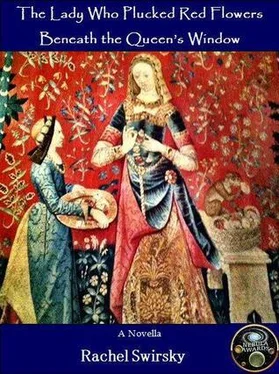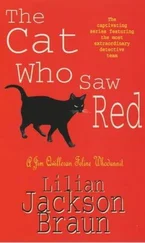My straw eyes rustled as they blinked in surprise. “A walk?”
Misa laughed. “Try it out.”
She laughed again as I took one precarious step forward and then another. The straw body’s joints creaked with each stiff movement. I felt awkward and graceless, but I couldn’t deny the pleasure of movement.
“Come on,” Misa repeated, beckoning.
She led me down a corridor of gleaming white marble. Arcane symbols figured the walls. Spell-remnants scented the air with cinnamon and burnt herbs, mingling with the cool currents that swept down from the vaulted ceiling. Beneath our feet, the floor was worn from many footsteps and yet Misa and I walked alone. I wondered how it could be that a place built to accommodate hundreds was empty except for a low-ranking scholar and a dead woman summoned into an effigy.
My questions were soon answered when a group of students approached noisily from an intersecting passageway. They halted when they saw us, falling abruptly silent. Misa frowned. “Get on!” she said, waving them away. They looked relieved as they fled back the way they’d come.
The students’ shaved heads and shapeless robes made it difficult to discern their forms, but it was clear I had seen something I hadn’t been meant to.
“You train men here,” I ascertained.
“Men, women, neuters,” said Misa. “Anyone who comes. And qualifies, of course.”
I felt the hiss of disappointment: another profane, degraded culture. I should have known better than to hope. “I see,” I said, unable to conceal my resentment.
Misa did not seem to notice. “Many cultures have created separate systems of magic for the male and female. Your culture was extreme, but not unusual. Men work healing magic, and women sing weather magic, or vice versa. All very rigid, all very unscientific. Did they ever try to teach a man to wail for a midnight rain? Oh, maybe they did, but if he succeeded, then it was just that one man, and wasn’t his spirit more womanly than masculine? They get noted as an exception to the rule, not a problem with the rule itself. Think Locas Follow with the crickets, or Petrin of Atscheko, or for an example on the female side, Queen Urte. And of course if the man you set up to sing love songs to hurricanes can’t even stir up a breeze, well, there’s your proof. Men can’t sing the weather. Even if another man could. Rigor, that’s the important thing. Until you have proof, anything can be wrong. We know now there’s no difference between the magical capabilities of the sexes, but we’d have known it earlier if people had asked the right questions. Did you know there’s a place in the northern wastes where they believe only people with both male and female genitals can work spells?”
“They’re fools.”
Misa shrugged.
“Everyone’s a fool, sooner or later. I make a game of it with my students. What do we believe that will be proven wrong in the future? I envy your ability to live forever so you can see.”
“You should not,” I said, surprised by my own bitterness. “People of the future are as likely to destroy your truths as to uncover your falsehoods.”
She turned toward me, her face drawn with empathy. “You may be right.”
We entered a vast, mahogany-paneled room, large enough to quarter a roc. Curving shelf towers formed an elaborate labyrinth. Misa led me through the narrow aisles with swift precision.
The shelves displayed prisms of various shapes and sizes. Crystal pyramids sat beside metal cylinders and spheres cut from obsidian. There were stranger things, too, shapes for which I possessed no words, woven out of steel threads or hardened lava.
Overhead, a transparent dome revealed a night sky strewn with stars. I recognized no patterns among the sparkling pinpricks; it was as if all the stars I’d known had been gathered in a giant’s palm and then scattered carelessly into new designs.
Misa chattered as she walked. “This is the academy library. There are over three hundred thousand spells in this wing alone and we’ve almost filled the second. My students are taking bets on when they’ll start construction on the third. They’re also taking bets on whose statue will be by the door. Olin Nimble’s the favorite, wouldn’t you know.”
We passed a number of carrel desks upon which lay maps of strange rivers and red-tinted deserts. Tubes containing more maps resided in cubby holes between the desks, their ends labeled in an unfamiliar alphabet.
“We make the first year students memorize world maps,” said Misa. “A scholar has to understand how much there is to know.”
I stopped by a carrel near the end of the row. The map’s surface was ridged to show changes in elevation. I tried to imagine what the land it depicted would look like from above, on a roc’s back. Could the Mountains where the Sun Rests be hidden among those jagged points?
Misa stopped behind me. “We’re almost to the place I wanted to show you,” she said. When we began walking again, she stayed quiet.
Presently, we approached a place where marble steps led down to a sunken area. We descended, and seemed to enter another room entirely, the arcs of the library shelves on the main level looming upward like a ring of ancient trees.
All around us, invisible from above, there stood statues of men and women. They held out spell spheres in their carved, upturned palms.
“This is the Circle of Insomniacs,” said Misa. “Every Insomniac is depicted here. All the ones we’ve found, that is.”
Amid hunched old women and bearded men with wild eyes, I caught sight of stranger things. Long, armored spikes jutted from a woman’s spine. A man seemed to be wearing a helmet shaped like a sheep’s head until I noticed that his ears twisted behind his head and became the ram’s horns. A child opened his mouth to display a ring of needle-sharp teeth like a leech’s.
“They aren’t human,” I said.
“They are,” said Misa. “Or they were.” She pointed me to the space between a toothless man and a soldier whose face fell in shadow behind a carved helmet. “Your statue will be there. The sculptor will want to speak with you. Or if you don’t want to talk to him, you can talk to his assistant, and she’ll make notes.”
I looked aghast at the crowd of stone faces. “This—this is why you woke me? This sentimental memorial?”
Misa’s eyes glittered with excitement. “The statue’s only part of it. We want to know more about you and the Kingdom Where Women Rule. Sorry, the Land of Flowered Hills. We want to learn from you and teach you. We want you to stay!”
I could not help but laugh, harsh and mirthless. Would this woman ask a piece of ancient stone wall whether or not it wanted to be displayed in a museum? Not even the worms who tried to steal my spells had presumed so much.
“I’m sorry,” said Misa. “I shouldn’t have blurted it out like that. I’m good at sniffing. I’m terrible with people. Usually I find the Great Ones and then other people do the summoning and bring them to the library. The council asked me to do it myself this time because I lived in a women’s colony before I came to the academy. I’m what they call woman-centered. They thought we’d have something in common.”
“Loving women is fundamental. It’s natural as breeze. It’s not some kind of shared diversion.”
“Still. It’s more than you’d have in common with Olin Nimble.”
She paused, biting her lip. She was still transparently excited even though the conversation had begun to go badly.
“Will you stay a while at least?” she asked. “You’ve slept dark for millennia. What’s a little time in the light?”
I scoffed and began to demand that she banish me back to the dark—but the scholar’s excitement cast ripples in a pond that I’d believed had become permanently still.
Читать дальше












